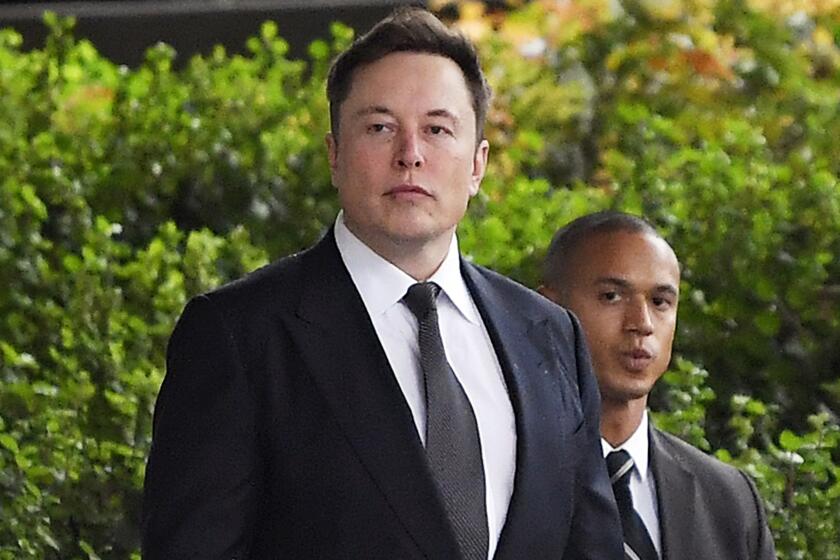Eat the HNWIs! But don’t call them rich

- Share via
What do you think of the phrase “high net worth individuals” to refer to the people more commonly known as rich?
I think it’s cumbersome, euphemistic and vaguely evil.
I realize it’s not new. The financial services industry has been using it for decades, especially in the wealth management part of the business.
It turns up from time to time in The Times and other mainstream publications, along with its diminutive “HNWIs” and its compadres “very high net worth individuals” and “ultra high net worth individuals.” Last year Forbes called the phrase “the term of art for wealth right now.”
Opinion Columnist
Nicholas Goldberg
Nicholas Goldberg served 11 years as editor of the editorial page and is a former editor of the Op-Ed page and Sunday Opinion section.
And I swear that it‘s making a crossover jump from financial jargon into ordinary vocabulary. What do I base that assertion on? The entirely unscientific fact that I’ve heard it used twice by friends in the last month — but used seriously, with no irony, and each time in a non-investing, non-wealth management context.
This bugs me for a variety of reasons.
For one thing, what’s wrong with “rich”? Is it not doing its job? That blunt and well-established word has been with us for more than 1,000 years, since the days of Old English (the language, not the furniture polish), which means it was in use before the Norman Conquest in 1066.
In Old English, “rich” already meant “to have much money or abundant assets.” “Net worth” didn’t mean anything.
That state of affairs lasted for a long time, and no one seemed to mind.
Love shall “pluck down the rich, enrich the poor with treasures,” wrote Shakespeare approximately 430 years ago in what may be the first poem he ever published.
He also wrote: “If thou art rich, thou art poor.” (And if you’re wondering what he meant, he explained: “For like an ass whose back with ingots bows, thou bear’s thy heavy riches but a journey, and death unloads thee.”)
We may think any of us can become the next Bezos or Musk. But in fact, social mobility is not really a thing in America anymore. Income inequality is.
Less than 200 years later, Jean-Jacques Rousseau reportedly coined the phrase “eat the rich” when he said: “When the people shall have no more to eat, they will eat the rich!”
Of course he said it in French, but he used the words “le riche.” Nothing about “le net worth.”
“Rich” was good enough for Shakespeare and good enough for Rousseau but not for today’s money managers and others who cater to the needs of the super wealthy. They apparently prefer this sort of clunky locution: “I think we’re going to see an absolutely fantastic 2021, 2022, 2023 and 2024, especially for the high net worth individual.”
The person who said that — one of L.A.’s biggest real estate brokers, quoted in The Times — meant, simply, that the rich will get richer.
So why didn’t he just say so? Because the whole point of this phrase is not to say blunt or disquieting things.
Instead of grousing over a tax increase on rich Californians, work to create a system in which everyone earns more and can therefore pay higher taxes.
Of course I can’t be absolutely certain what’s behind the phrase’s currency. It could be as simple as “Why use one word when four will do?”
But I suspect the point is to decouple wealth from value judgments, to make rich people feel better about themselves.
“Rich” is a little vulgar. It’s a little embarrassing. And it’s a little pejorative. As recently as 2003, Bill Gates, asked whether he was rich, would say only: “At this point, I’m clearly not by some definition middle class.” One corporate CEO wrote in an op-ed piece: “I object strongly to calling the wealthy ‘rich.’”
There are, of course, plenty of other choices. They’re “loaded.” They’re “rolling in it.” They’ve got “deep pockets.” They’re “fat cats” or “robber barons” (especially if they lived in the Gilded Age). They’re the “filthy” rich. More generously, they’re affluent, wealthy, prosperous, well-to-do. They’re — and this was new to me — “oofy.”
Maybe finance types prefer “high net worth individual” because it sounds technocratic, almost scientific.
Which is why it’s weird that the term has no precise definition. As far as I can gather, HNWIs generally have liquid assets between $1 million and $5 million, VHNWIs have between $5 million and $30 million, and UHNWIs have more than $30 million.
Increasing income inequality is the root cause of America’s COVID failings.
(LNWIs, by the way, turn up only rarely. They’re in a song posted online titled “Low Net Worth Individual” and in Gary Shteyngart’s dystopian novel “Super Sad True Love Story,” in which there are only two social classes in a futuristic America: high net worth individuals and low net worth individuals.)
Let’s face it, 1-percenters are on the defensive. Their wealth is credited less and less to their hard work and more to their “advantages.” More Americans think billionaires are bad for society than good.
Billionaires can go full years paying no federal income tax. Upward social mobility has been outed as a myth. Homelessness rages on city streets and a third of California’s 40 million residents live close to the poverty line, while Elon Musk and Jeff Bezos battle for the title of richest person in the world, each with fortunes that at one point or another have crossed the $200-billion mark.
When things get like this, as any marketing consultant can tell you, it’s time for a rebranding!
But I say don’t let them do it. Don’t elevate weasel words, code words or empty words over real ones.
And while we’re at it, let’s do something about the grotesque level of income inequality in this country. Otherwise, when the people shall have no more to eat, they will eat the HNWIs. Or at least the UHNWIs.
More to Read
A cure for the common opinion
Get thought-provoking perspectives with our weekly newsletter.
You may occasionally receive promotional content from the Los Angeles Times.













